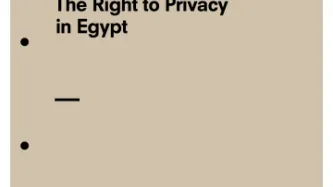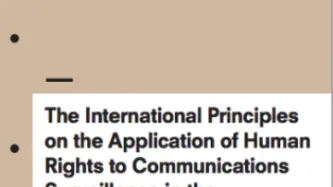Search
Content type: News & Analysis
Global problems require global solutions. One of the significant emerging threats to human rights and democracy today is the incredible and mostly unaccountable spread of surveillance technologies.
The rapid proliferation of these systems has created a shadowy billion-dollar industry, where companies sell spying equipment with impunity to authoritarian regimes, who wield them against journalists, political activists, and human rights defenders.
Given the scale and international scope of this…
Content type: Advocacy
This stakeholder is a submission by Privacy International (PI), the Egyptian Initiative for Personal Rights (EIPR), the Association for Freedom of Thought and Expression (AFTE), and Association for Progressive Communication (APC). Together PI, EIPR, AFTE and APC wish to bring their concerns about the protection and promotion of the right to privacy in Egypt before the Human Rights Council for consideration in Egypt’s upcoming review.
Content type: News & Analysis
In Geneva this week, an expert seminar will be held at the Human Rights Council on the right to privacy. To inform these discussions and debates, Privacy International is releasing our report, The State of Privacy 2014, which identifies recent accomplishments from around the world, and highlights significant challenges ahead for this right.
To read the full report, go here.
Promoting and defending the right to privacy in national and international policy discourses is always an interesting…
Content type: News & Analysis
“Open government” – the push for greater transparency, accountability and innovation from governments – is an idea that has gained increasing traction in recent years, as the potential for new technologies to enhance democracy is being realised.
But making government more open and responsive should not mean compromising on privacy and data protection. The Open Government Guide outlines steps governments can take towards more open government and Privacy International has written a draft chapter…
Content type: News & Analysis
On Monday, Privacy International submitted a dossier to the National Cyber Crime Unit of the National Crime Agency on behalf of Ethiopian political refugee Tadesse Kersmo, asking them to investigate the potentially unlawful interception of Tadesse's communications, as well as the role a British company played in developing and exporting the invasive commercial surveillance software called FinSpy that was found on Tadesse's computer.
Here, we address some of…
Content type: Press release
In response to the ruling against David Miranda over his detention at Heathrow, Privacy International Executive Director Dr. Gus Hosein said:
Schedule 7 of the Terrorism Act of 2000 is a law intended to fight terrorism, and was not drafted to target people like David Miranda. In this instance however the government used it to seize the devices of journalists to intimidate and obstruct the reporting of mass and unlawful surveillance practices of the British government. To equate journalism…
Content type: News & Analysis
After suffering years of persistent harassment, violence, and surveillance at the hands of his oppressive government, Tadesse Kersmo had enough. Tired of living under constant monitoring, Tadesse and his wife escaped Ethiopia, where they had been politically active for years, and were granted asylum in the United Kingdom in 2009.
It was only a few years later that they discovered that this escape was an illusion, and that they had been followed from Ethiopia to England. He may have left his…
Content type: News & Analysis
While revelations about NSA mass surveillance dominated the news in late 2013, a less well-publicised scandal was engulfing the Australian intelligence services, which had just raided the offices of a lawyer representing the small nation of East Timor in an international case against Australia.
The case concerns allegations that Australia spied on East Timor’s cabinet during sensitive commercial negotiations over oil and gas revenues. If true, this was spying on the basis of greed, to exploit…
Content type: News & Analysis
Australia’s intelligence agencies have beenconducting mass surveillance for more than half a century, routinely sharing the fruits of such labours with their Five Eyes allies in the US, UK, Canada and New Zealand. Australian spying facilities are staffed by the NSA and the UK’s GCHQ, and Australian intelligence officers are routinely tasked with work by their Five Eyes counterparts. Australia and its allies have infiltrated every aspect of the modern global communications…
Content type: News & Analysis
Just a few weeks ago, thousands of Argentinians had their privacy rights violated when the country’s electoral registration roll, which had been made available online, experienced a major leak of personal data following the presidential election.
Despite some early warnings on the weaknesses of the system, the government did nothing to fix the situation, allowing serious technical flaws in an online system to persist and refusing to respond to the crisis, further…
Content type: News & Analysis
Two new categories of surveillance systems were added into the dual-use goods and technologies control list of the Wassenaar Arrangement last week in Vienna, recognising for the first time the need to subject spying tools used by intelligence agencies and law enforcement to export controls.
While there are many questions that still need to be answered, Privacy International cautiously welcomes these additions to the Wassenaar Arrangement. Undoubtedly, these new…
Content type: News & Analysis
A strong, unified voice from the tech industry is absolutely essential to reforming the mass and intrusive surveillance programs being run by the Five Eyes, so we welcome today's statement from AOL, Apple, Google, Facebook, LinkedIn, Microsoft, Twitter, and Yahoo.
Companies have obligations to respect human rights and not be complicit in mass surveillance. Given what has been publicly revealed over the past six months, we must know for certain that the companies we entrust with our information…
Content type: Long Read
The recent revelations, made possible by NSA-whistleblower Edward Snowden, of the reach and scope of global surveillance practices have prompted a fundamental re- examination of the role of intelligence services in conducting coordinated cross-border surveillance.
The Five Eyes alliance of States – comprised of the United States National Security Agency (NSA), the United Kingdom’s Government Communications Headquarters (GCHQ), Canada’s Communications Security Establishment Canada (CSEC), the…
Content type: News & Analysis
Through the Aiding Privacy project, Privacy International is promoting the development of international standards around data protection in the humanitarian and development fields and working with relevant organisations to make this happen.
A new contribution towards this goal, Protecting Beneficiary Privacy: Principles and operational standards for the secure use of personal data in cash and e-transfer programmes, was released last week by the Cash Learning Partnership (CaLP) and…
Content type: News & Analysis
With the launch of the "Eyes Wide Open" project, Privacy International has put together a fact sheet about the secretive Five Eyes alliance. Consider this a guide to the secret surveillance alliance that has infiltrated every aspect of the modern global communications system.
Beginning in 1946, an alliance of five English-speaking countries (the US, the UK, Australia, Canada and New Zealand) developed a series of bilateral agreements over more than a decade that became known as the UKUSA…
Content type: News & Analysis
For nearly 30 years, the UK's wiretapping laws have been the subject of annual reports. Since 2002, they are available around the web (for now), but earlier than that, it is a rabbit warren of possible locations.
In practice, the reports are solely available from the Parliamentary Archives if and only if you are a member of an institution which has paid for access. Requesting a copy from elsewhere sends you to this destination.
The current Interception of Communications Commissioner didn't…
Content type: Press release
The United Nations General Assembly should approve a new resolution and make clear that indiscriminate surveillance is never consistent with the right to privacy, five human rights organizations said in a November 21, 2013 letter to members of the United Nations General Assembly.
After heated negotiations, the draft resolution on digital privacy initiated by Brazil and Germany emerged on November 21 relatively undamaged, despite efforts by the …
Content type: News & Analysis
The following is an excerpt from a blog post that originally was published by EJIL: Talk!, and is written by Carly Nyst, Head of International Advocacy at Privacy International:
The recent revelations of global surveillance practices have prompted a fundamental re-examination of the role and responsibility of States with respect to cross-border surveillance. The patchwork of secret spying programmes and intelligence-sharing agreements implemented by parties to the Five Eyes arrangement (the US…
Content type: News & Analysis
Humanitarian agencies are collecting personal information for Syrians caught in the crossfire of a drawn-out and bloody civil war. Indeed, refugees fleeing persecution and conflict, need to access services and protection offered by the world’s humanitarian community. But in the rush to provide necessary aid to those afflicted by the crisis in Syria, humanitarian organisations are overlooking a human right that also needs protecting: the right to privacy.
Humanitarian and aid agencies are…
Content type: News & Analysis
On at least two separate occasions, the South African government has provided funding to a well-resourced surveillance company for the development of mass surveillance technologies, the very equipment found to be used by the Gaddafi's repressive military regime in Libya, according to documents uncovered by Privacy International.
In February 2008, sandwiched between funding for a mechanical grape conveyor belt, and funding to improve gear changing and engine efficiency, the South African…
Content type: News & Analysis
Privacy International is pleased to announce the Surveillance Industry Index, the most comprehensive publicly available database on the private surveillance sector.
Over the last four years, Privacy International has been gathering information from various sources that details how the sector sells its technologies, what the technologies are capable of and in some cases, which governments a technology has been sold to. Through our collection of materials and brochures at surveillance trade…
Content type: Report
Privacy International is grateful to the students and staff of the Hebrew University of Jerusalem Faculty of Law Clinical Legal Education Centre, for providing research assistance to this paper.
The advent of new technologies and the Internet have provided new challenges to long-standing human rights norms. By facilitating increased State surveillance and intervention into individuals’ private lives, the spread of digital technologies has created a serious need for States to update their…
Content type: News & Analysis
Privacy International today is proud to announce our new project, Aiding Privacy, which aims to promote the right to privacy and data protection in the development and humanitarian fields. Below is an outline of the issues addressed in our new report released today, Aiding Surveillance.
New technologies hold great potential for the developing world. The problem, however, is that there has been a systematic failure to critically contemplate the potential ill effects of deploying technologies in…
Content type: News & Analysis
Today's hearing was built up in some media circles as an historic ‘public grilling’ of the heads of the UK’s Intelligence Agencies as Mi5, Mi6 and GCHQ appeared in public in front of their oversight committee, the Intelligence and Security Committee.
Nothing would be further from the truth. It was tame, predictable, and limp. No member of the public concerned with the activities of our intelligence agencies would be comforted by the ISC’s performance. The Committee was almost fawning in their…
Content type: Long Read
Privacy International filed formal complaints with the Organisation for Economic Cooperation and Development (OECD) in the UK against some of the world’s leading telecommunication companies, for providing assistance to British spy agency GCHQ in the mass interception of internet and telephone traffic passing through undersea fibre optic cables.
According to recent reports, BT, Verizon Enterprise, Vodafone Cable, Viatel, Level 3, and Interoute granted access to their fibre optic…
Content type: Press release
General Assembly Should Pass Strong Resolution on the Right to Privacy in the Digital Age
(New York, November 21, 2013) – The United Nations General Assembly should approve a new resolution and make clear that indiscriminate surveillance is never consistent with the right to privacy, five human rights organizations said in a November 21, 2013 letter to members of the United Nations General Assembly.
After heated negotiations, the draft resolution on digital…
Content type: News & Analysis
As anticipated, the Snowden revelations – first referred to in the opening session as the “elephant in the room” – soon became the central focus of many of the 150 workshops that took place during the 8th Internet Governance Forum (IGF) in Bali, and dominated the bilateral meetings that took place between governments, the private sector, the tech community, and civil society.
The various stakeholders arrived at the IGF ready to pursue their own agendas. The U.S. came to try and restore…
Content type: News & Analysis
Just search for the term "surveillance state" and you’ll pull up various uses of the term or news articles citing the phrase.
In some respects, this newfound concern can’t be a surprise; given vast new amounts of information in the public sphere since the Edward Snowden leaks began in June. However, it is critical to nail down the exact meaning of the term, so as the public and governments have the debate over State spying, we can actually know what we're talking about. Most importantly, this…
Content type: News & Analysis
For the first time since the Snowden revelations exposed the vast reach and scope of Britain's surveillance and intelligence activities, Parliament will openly debate the need for greater oversight of the intelligence and security services.
In the five months since the first of the Snowden leaks offered an insight into the government's mass surveillance capabilities, the political discourse has been disappointingly devoid of any serious discussion of the fundamental issues raised about the…
Content type: News & Analysis
http://www.spiegel.de/international/world/how-the-nsa-spies-on-international-bank-transactions-a-922430.html*Update: The European Parliament has voted to recommend suspension of its Terrorist Finance Tracking Program (TFTP) agreement with the US. The vote in favour of suspension only highlights how the NSA’s reported activities have undermined the agreement. Negotiations should immediately commence to strengthen the privacy and redress provisions, to ensure that governments…


























